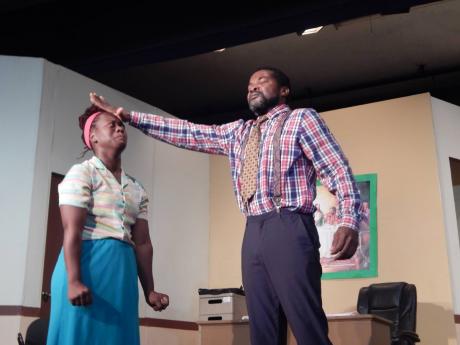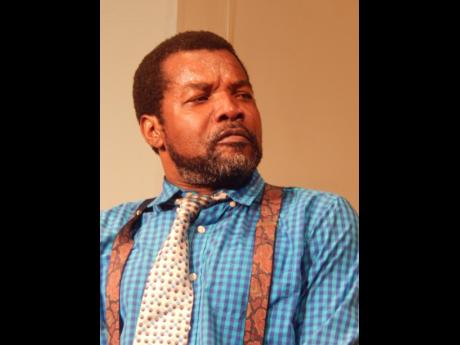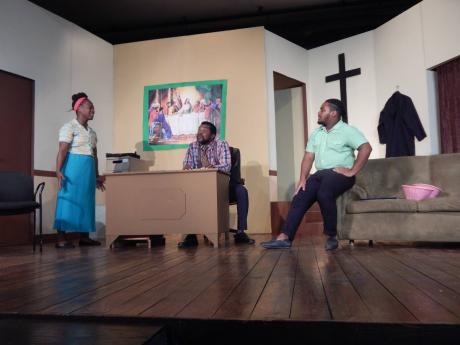‘No Hope for Hopie’ – Basil Dawkins’ best play?
Since he began writing and producing plays in 1980, Basil Dawkins has won several Actor Boy Awards for Best New Jamaican Play. He may do so again with his current play, No Hope for Hopie which is being shown at the Little Little Theatre.
Spoiler alert: there is hope for her. Dawkins may have been in an uncharacteristically pessimistic mood when he named the play – maybe even while writing the script. The play is unusually serious. Consider the themes – rape, abortion, class prejudice, poor self-esteem, snobbery.
No wonder the playwright’s daughter, T.K. Dawkins, the director of this, and the last few of Dawkin’s plays, says of Hopie: “I BEGGED my father to write a different play. Don’t get me wrong, it’s not that I didn’t like the script. It’s because I believed that after the heaviness of the last couple of years we all needed more laughter than drama.”
Not to worry, Dawkins has not abandoned his accustomed genre of writing, the “dramedy” (a combination of drama and comedy), and he solves the problems mentioned by the end of the play. No doubt, the production’s consultant psychiatrist, Professor Wendel Abel, was of assistance.
When we learn from the Playwright’s Notes in the printed programme that Hopie was written while Dawkins was “struggling to cope with the new realities of the [COVID -19] lockdowns and early curfews and general uncertainties,” we can understand his depression. Nevertheless, we must acknowledge the situation’s irony: the very lockdown of theatres for two and a half years that prevented Dawkins from producing his plays and earning money afforded him the time to write not one, but four plays.
His average is a play a year, so the “depression” clearly had him firing on all six cylinders. Two of the plays have been produced so far; Hide Your Husband opened last April. It was far lighter in tone than Hopie – and not as interesting.
Without being solemn, Hopie is serious, and Dawkins’ wish for the play shows its tone started with its objective. He writes: “I hope this play will engage and encourage discussions that will lead to greater understanding of each other and sensitise us of the communities of the underserved as we continue in the never-ending struggle to make our country a kinder and gentler place for all the individuals who occupy this space.”
EXCELLENT ACTING AND DIRECTING
Acting and directing overlap considerably; you see the one in, and because of, the other. Kudos must therefore go to both T.K. Dawkins and the three-person cast for their fine work. Rachael Allen plays the title role of a humble young woman in “a ghetto church”. The phrase is used by the pastor, himself, Amos Banks (Dennis Titus). His son, Stanley, is played by Lennox Richards.
The acting is convincing, proof of which comes when the audience calls out advice to the characters on stage. Everybody gets advice – negative or positive – and this might suggest that they are equally experienced. In fact, though all were trained at the Edna Manley College’s School of Drama, Titus left decades ago while Richards is a recent graduate. Allen is in-between.
I have congratulated Basil Dawkins, as producer, for being the first in Jamaica’s theatre history to formally advertise so many performances of the play each week. The schedule is Tuesday to Fridays from 8:30 p.m., and 2 p.m., 5 p.m. and 8:30 p.m. on Saturdays and Sundays.
Even the legendary ‘roots’ plays producer Ralph Holness could only manage to have three shows a day occasionally. This was at downtown Kingston’s Ward Theatre – of blessed memory?
Asked why he was having six shows on weekends, Basil gave The Gleaner the surprising news that the matinees were becoming more popular than the night offerings. This was partly because Dawkins’ faithful audiences are ageing – remember, he has been producing for decades and, he says, it’s not unusual to see audience members in wheelchairs – and because many are scared to be out late at night.
I am not entirely happy with the ending. Psychiatrists may be right that a recent act of rape can be pushed so far into the subconscious that it is forgotten. But a playwright’s duty is not merely to state facts; that’s a reporter’s task; the playwright must do more than tell; he must show the whys and wherefores.
It would be unfair to give more of the plot away, and even those who dispute the ending will enjoy the show as a whole.



